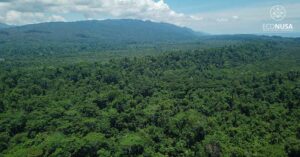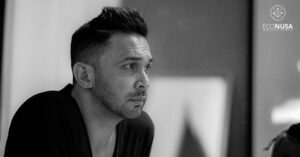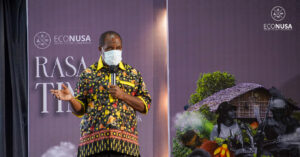
Sago is an inherent part of the culture of the Papuan people, as well as the Kombai and Korowai tribes who live in the sago forests that are within the administration of Boven Digoel Regency, Papua. For them, sago is one of the primary elements to meet the needs of clothing, food, and housing.
Sago even added value in the Sago Worms Festival held in Weyunggeo Hamlet, Uni village, Bomakia district, Boven Digoel Regency, Papua Province, last Wednesday (26/9). In addition to being the main object of the sago festival that was first held in Papua, sago was also an attraction in bringing a number of participants from inside and outside Papua.
Also attending the all-night festival was Assistant II of Papua Regional Secretary for Economic Affairs and Welfare Noak Kapisa, Chairman of the Regional Representative Council Boven Digoel Ayub Santi and Boven Digoel Regent Benediktus Tambonop, Silva Papua Lestari Foundation, and the community of Aiko Village, Boma dua Village, Vevero Village, Dema Village, Wanggemalo Village, Ugo Village and Havenda Village.
However, the existence of sago in the festival and in the culture of the Papuan community in general also depends on the availability of these plants in the forest. If the condition of the forest is damaged or continuously eroded by land requirements for other uses, the sago is also damaged.
In fact, there are noble ideals to make this Festival as a tourist attraction to bring in revenue for the local Regional Government.
“By organizing this festival, it means that it requires a lot of sago, if there is land conversion, there will be a threat and a degraded culture,” explained Kristian Ari from the Silva Papua Lestari Association.
Noak Kapisa on the sidelines of the interview stated that he would guarantee to focus on giving indigenous people access to forests, because that is what the community needs to protect their forests. According to him, the Provincial Government will try to formulate regulations that govern it.
“Try sending the draft (local regulation for the recognition of Indigenous Peoples) to us Provincial Government. Later we will try to make local regulations for indigenous people, because we already have a team, “he explained.
He said he would explain the details of the forms of recognition of indigenous peoples. “For example, what is the access of the community to enter the forest management. With the decision of the Constitutional Court number 35 anyway, “he said.
Ayub Santi on the same occasion said that recognition through the Regional Regulation could be done by the Regional House of Representative or the Provincial Government. However, what needs to be done now is to make the Central Government also in line with the Regional Regulation issued by the Regional House of Representatives and the Provincial Government of Papua.
“This must be recognized by the central government, so there must be a certain study. Because in our area I honestly say that the Boven Digoel forest is already owned by central people. Already in plots. That is what we have to discuss carefully, later if the province supports (regional regulations) maybe the province will deliver it to the central government, “he said.
Meanwhile Benedict Tambonop said he would ensure the legalization of the regional regulation was quick to do. “Yes, we will push to quickly knock the hammer,” He added.
The rate of land conversion continues to occur in Indonesia and even in Papua. The Ministry of Environment and Forestry noted that in 2015, the total area of forests in Papua and West Papua Provinces – including permanent production forests, limited production forests, and protected forests – reached 38,153,269 hectares (ha). Even though in 2009, the forest area reached 42 million ha. In 2011 Greenpeace recorded the average annual deforestation rate in Papua Province reaching 143,680 ha, while in West Papua Province it was 293 thousand ha.
The surrounding community also gave their concerns. One of the Kombai people, Daniel asked for protection by the Government and others. “Our forest is not too big, only hundreds of meters and we lose if our forest is taken from the wood. Then do not enter companies so that our sago is not cut down or stepped on. That makes us lose, “Daniel said.
For this reason, commitment from various parties is needed. Not only from the Government, other stakeholders such as NGOs and the business world must also participate in saving and restoring forests in the eastern part of Indonesia.
New hopes will grow in the holding of the International Conference on Biodiversity, Ecotourism, and Creative Economy, in Manokwari, West Papua on 7-10 October. At least, one of the agendas in the Conference is to sign a Special Regional Regulation to establish West Papua as a Conservation Province as declared in 2015.







